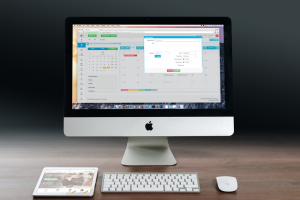Mobile phones have continued to be the central tools for managing people’s lives, seeking entertainment, and connecting with communities around the world. When it comes to mobile app experiences, a high bar exists. In today’s business world, people expect seamless, secure, lightning-fast apps, and mobile apps that are fine-tuned to their particular needs. Ionic is a technology that lets you build full-fledged apps for both iOS and Android using your existing web development skills and without needing any deep platform-specific knowledge. Read on to understand what ionic mobile app development is all about.
What Is Ionic Mobile App Development?
Ionic is an open-source UI software development kit for cross-platform app development. Ionic usually utilizes standardized web technologies, such as HTML, CSS, and JavaScript. Further, ionic comes with a large catalog of standard elements that you can use just like you would use Bootstrap elements: cards, buttons, inputs, toggles, lists, segments, modals, row/column grid, and many others. By default, these elements usually change their appearance to look native on iOS and Android, but you can actually customize how they look if needed. If you’re familiar with web development, you can create apps and add them to an app store.
The very first versions of Ionic were tightly coupled with Angular, which is a popular front-end framework used for building dynamic web pages as well as Progressive Web Applications (PWAs). The later versions of Ionic use web components that pair with additional popular JavaScript frameworks, which include Angular, React, or Vue. Developers have the allowance of foregoing a framework and building purely in JavaScript. Ionic is also backend agnostic, connecting to Azure and Firebase.
Ionic was created back in 2013. It is one of the world’s most popular cross-platform mobile development technology stacks. Since its creation and inception, over five million apps have been developed using Ionic. Ionic modules are available via a node package manager (npm). It usually requires Node.js installed in order to function as part of a larger JavaScript ecosystem. The Ionic framework has gained popularity over the years, thanks to its ability to provide platform-specific user interface (UI) elements. This is through a vast library of native components for both iOS and Android platforms, as well as PWAs. Ultimately, this makes Ionic a robust design system that can help you bring your apps to market fast, efficiently, and economically.
Why Use Ionic?
It is usually challenging to develop native apps. Developing native apps alone requires you to learn how to use Android Studio’s IDE (Integrated Development Environment) and understand Java programming language. You will also need to know Android-specific concepts, activities, and intents, and you will create your app UIs with a custom XML syntax. For iOS, you will be required to use the Xcode IDE as well as Apple’s Objective-C or Swift programming languages.
Developing apps this way not only requires learning multiple coding languages and tools but also means you end up re-coding the same logic for two or three different programming languages and mobile platforms. This means that developing apps natively usually takes a lot of time, money, and skill. Ionic Mobile Development provides you with a single code base that works for different platforms.
Advantages of Using Ionic for Mobile App Development
Here are the advantages of Ionic for mobile applications development:
Developer Friendly
Since Ionic is built on standardized web technologies, web developers can easily build mobile apps. Ionic makes it possible to build an app without requiring to learn new skills. If you’re a web developer, you can build an app without having to learn programming languages like Swift for Apple, or Kotlin for Android. This means that you don’t have to hire native developers when creating mobile apps.
A single Codebase for all Platforms
With Ionic, all you need is one single codebase for every platform you want to run your application on. And the best part is, Ionic allows you to build mobile apps without the need for native developers. As long as you’re familiar with web technologies like Angular, you can use it to create fully-functional applications. Thus, the Ionic framework creates one codebase for all your platforms.
Extensive Component Library
Ionic has made the app development process quite easy as a result of its extensive component library. This allows you to use the components as ready-made elements, such as buttons, tabs, and other navigation elements. You can therefore construct your graphic user interface and customize them according to your needs. The component library is one of the reasons why Ionic is great for mobile app development.
Wide Range of Integration Capabilities
If you feel like you’re not gaining enough from your Ionic application, you can integrate it with different tools. Find the list of technologies to integrate with on the Ionic website, providing easy access to analytical instruments, payment systems, security, as well as testing tools.


